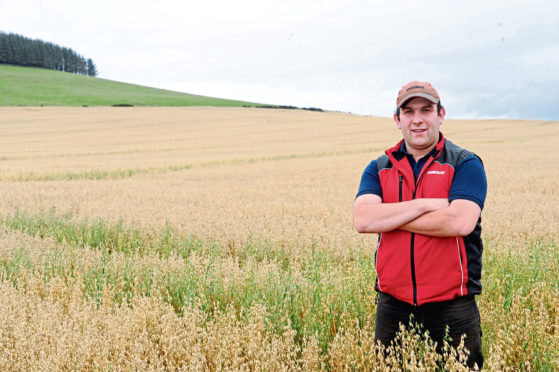An Aberdeenshire farmer has seen encouraging results from introducing sheep grazing to his arable unit over the winter months.
Iain Wilson, farm manager at Tulloch Farms, manages almost 2,000 acres of land in total.
The majority of land is used for arable cropping including spring and winter oats, winter wheat, winter barley and oilseed rape, and some land is let out for potatoes.
A herd of 250 suckler cows is kept on the remaining 250 acres, which is down to grassland.
Mr Wilson supplies food giant Quaker Oats, who have a preference for using the Conway variety of oats in their products because of the strong health benefits and the ease of milling.
However achieving yield has been a challenge at Tulloch Farms, which is located near Laurencekirk.
In a bid to improve yield, Mr Wilson embarked on a trial project which saw 450 Blackface ewe lambs graze on 25 acres of oats, 25 acres of wheat and 37 acres of oilseed rape.
The flock grazed on each block for four weeks, starting from the end of November.
Mr Wilson said the sheep feed on the foliage, which helps stave off disease and winter kill, while giving the roots time to grow stronger.
Although grazing sheep on crops is often seen as a way of reducing the need for artifical fertiliser, Mr Wilson continued to use it as the project was seen as a conditioning mechanism.
Mr Wilson said the benchmark yield for oats on the farm was 3.4 tonnes per acre, but the trial saw the grazed field produce 3.65 tonnes per acre.
The project is now going to the next stage, which will see sheep grazing an increased area of 250 acres, comprising 60 acres of oats and 190 acres of wheat.
Mr Wilson said the project had allowed crops to be planted earlier which meant a steadier workload across the season – a major benefit on a low staff, low machinery farm.
Taking a fee for having the sheep graze on the field, although at reduced rates, has brought another income stream for the farm, and initial results suggest the sheep are well conditioned by feeding on the thick foliage,” said Mr Wilson.
“This is by no means a new system,” he added.
“People of my father and grandfather’s generation are familiar with it and I’m not the only farmer doing it – but you have to be willing to take a risk.”
He added: “You have to have the right mindset for it and not care what the neighbours think when they see the state of the fields – I had a number of calls from people who thought the sheep had escaped and were ruining the crops.
“Later on, I also had calls from people who were very positive about how the crop looked after it had been grazed.”
Mr Wilson said co-operation was important to make the system work, especially when the sheep need to be moved.
“I’m grateful for the help and advice I’ve received from other farmers who are already doing this and I’m happy to discuss the process with anyone who is thinking of trying it,” he added.
